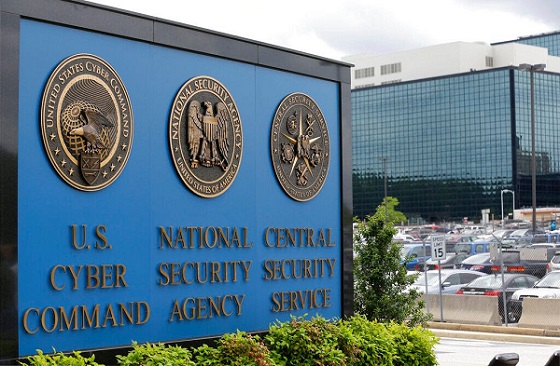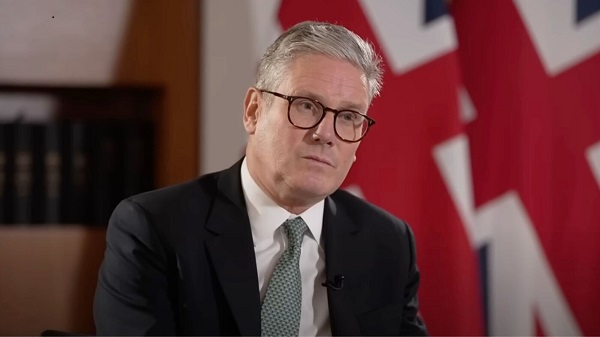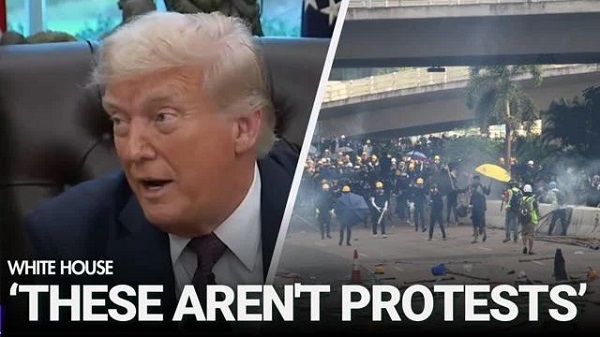Business
The NSA’s Secret Sex Chats

|
|
Intelligence officials maintained a chatroom to discuss polyamory and transgender surgeries, internal documents reveal.
The “intelligence community” is one of the most powerful parts of the American national security apparatus. In theory, it works tirelessly to keep the nation safe. But according to internal documents that we obtained, some intelligence agency employees have another on-the-job priority: sex chats.
We have cultivated sources within the National Security Agency—one current employee and one former employee—who have provided chat logs from the NSA’s Intelink messaging program. According to an NSA press official, “All NSA employees sign agreements stating that publishing non-mission related material on Intelink is a usage violation and will result in disciplinary action.” Nonetheless, these logs, dating back two years, are lurid, featuring wide-ranging discussions of sex, kink, polyamory, and castration.
One popular chat topic was male-to-female transgender surgery, which involves surgically removing the penis and turning it into an artificial vagina. “[M]ine is everything,” said one male who claimed to have had gender reconstruction surgery. “[I]’ve found that i like being penetrated (never liked it before GRS), but all the rest is just as important as well.” Another intelligence official boasted that genital surgery allowed him “to wear leggings or bikinis without having to wear a gaff under it.”
These employees discussed hair removal, estrogen injections, and the experience of sexual pleasure post-castration. “[G]etting my butthole zapped by a laser was . . . shocking,” said one transgender-identifying intel employee who spent thousands on hair removal. “Look, I just enjoy helping other people experience boobs,” said another about estrogen treatments. “[O]ne of the weirdest things that gives me euphoria is when i pee, i don’t have to push anything down to make sure it aims right,” a Defense Intelligence Agency employee added.
These revelations come at a moment of heightened scrutiny for the intelligence community. President Donald Trump, Defense Secretary Pete Hegseth, and Director of National Intelligence Tulsi Gabbard have each made the case that the intelligence agencies have gone “woke,” prioritizing left-wing activism over national security. These chat logs confirm their suspicions and raise fundamental questions about competence and professionalism.
According to our sources, the sex chats were legitimized as part of the NSA’s commitment to “diversity, equity and inclusion.” Activists within the agency used LGBTQ+ “employee resource groups” to turn their kinks and pathologies into official work duties. According to the current NSA employee, these groups “spent all day” recruiting activists and holding meetings with titles such as “Privilege,” “Ally Awareness,” “Pride,” and “Transgender Community Inclusion.” And they did so with the full support of NSA leadership, which declared that DEI was “not only mission critical, but mission imperative.”
In this case, “diversity” was not a byword for racialism, but rather a euphemism for sex talk. Last January, chatroom members discussed their practice of polyamory, or “ethical non-monogamy.” “[A] polycule is a polyamorous group,” one employee explained. “A is my [girlfriend], and B-G are her partners. . . . then B&C are dating but not C&D, nor E, F, or G with any of the others, though there are several MWB (metas-with-benefits) connections.” Another employee claimed to be part of a nine-member “polycule,” adding that “some of our friends are practically poly-mers, with all the connected compounds.”
At other times, the conversations became explicit. The active source at the NSA claimed to have witnessed hundreds of sexually provocative discussions, which, he added, occurred mostly on taxpayer time. The former NSA source who was familiar with the chats recalled being “disgusted” by a particularly shocking thread discussing weekend “gangbangs.”
The NSA sources also raised the question of some staffers’ mental fitness for the job. In one chat, an NSA employee insists on using “it” pronouns in lieu of the human “he” or “she” pronouns. “[I]t/its user here. While I understand we can make some people uncomfortable, keep in mind that the dehumanizing aspect either a) doesn’t apply or b) is a positive effect when we’re requesting it.” A commenter who disagreed was quickly dismissed by employees of the NSA and CIA, who claimed that refusing to use “it/its” pronouns amounted to “erasing” a transgender identity.
“These are folks with top secret clearances believing they are an IT!” said the NSA source.
With the Trump administration taking over, we may see changes. The NSA source said that staffers involved in employee resource groups fear the end of DEI. “[T]here are legal restrictions in place, but this admin has shown they don’t give a f**k about legality,” a staffer in space intelligence remarked about DEI staffers being placed on leave. Others have expressed opposition to Trump’s cabinet nominees.
A conflict is coming. These NSA chat logs suggest the presence of at least hundreds of gender activists within the intelligence services who cannot distinguish between male and female, and who believe that discussing castration, polyamory, and “gangbangs” is an appropriate use of public resources. For psychological and ideological reasons, these kinds of people will not be easily sidelined. The Trump administration should not only dismantle the structure of DEI but also terminate the employees who use it to advance gender activism at the expense of national security.
 |
A guest post by
|
Subscribe to Christopher F. Rufo.
For the full experience, upgrade your subscription.
Business
The Truth Is Buried Under Sechelt’s Unproven Graves

From the Frontier Centre for Public Policy
Millions spent, no exhumations. What are we actually mourning?
From Aug. 15 to 17, 2025, the Canadian flag flew at half-mast above the British Columbia legislature. The stated reason: to honour the shíshálh Nation and mourn the alleged discovery of 81 unmarked graves of Indigenous children near the former St. Augustine’s Residential School in Sechelt.
But unlike genuine mourning, this display of grief lacked a body, a name or a single verifiable piece of evidence. As MLA Tara Armstrong rightly observed in her open letter to the Speaker, this symbolic act was “shameful”—a gesture unmoored from fact, driven by rumour, emotion and political inertia.
The flag was lowered in response to claims from University of Saskatchewan archaeologist Dr. Terry Clark. According to announcements from both 2023 and 2025, Dr. Clark “discovered” 81 unmarked graves using ground-penetrating radar—a tool that detects changes in soil, not bones. Its signals require interpretation—and in this case, the necessary context never arrived.
Even more concerning, there has been no release of names or records. Chief Lenora Joe of the shíshálh Nation said the names of the children are “well known” to Elders. Yet none have been made public: not a single missing child reported, no date of disappearance, no death certificate, not even a family willing to speak openly.
Instead, we’re being asked to accept deeply held recollections as conclusive proof—without corroborating evidence.
The original 40 anomalies—first announced in April 2023—appear to be located beneath the paved parking lot of the band’s administrative and cultural hub, the House of Hewhiwus complex. This land has been excavated before. At no point were any human remains discovered. As former Chief Warren Paull confirmed, “remains were never found” and the stories circulating then “don’t include burial at all.” The pattern of red dots in the band’s video—a tidy grid beneath the asphalt—looked less like sacred ground and more like a plumbing schematic.
The grief narrative, meanwhile, was presented with great care. Professionally produced videos showed solemn Elders, blurred radar images and mournful speeches—all designed to evoke emotion while discouraging inquiry. In one video, Chief Joe warned that asking questions would “cause trauma.”
But reconciliation doesn’t mean blind acceptance. Silencing questions isn’t healing—it risks turning reconciliation into a one-way narrative.
In a 2025 follow-up, Dr. Clark reported another 41 anomalies—this time likely in the community’s own cemetery on Sinku Drive. Brief footage confirms that GPR was conducted among existing gravesites, where decayed wooden markers would naturally result in “unmarked” burials. As Tara Armstrong noted, finding undocumented graves in or near a cemetery is about as surprising as spotting seagulls at a landfill.
Even so, political leaders continued to validate the narrative.
The B.C. government endorsed the claims with another round of symbolic mourning. In doing so, it lent the power of the state to what increasingly resembles collective fiction. Since 2021, similar claims across Canada have triggered government apologies, funding announcements and media headlines—often without physical evidence.
Residential schools were bureaucratic institutions. They kept meticulous enrolment and death logs. The Truth and Reconciliation Commission, with eight years of access to these archives, conducted more than 6,500 interviews and reviewed thousands of documents. It found no cases of children who disappeared without a trace. Despite this, $2.6 million in federal funds was spent in 2025 alone on the Sechelt investigation.
This isn’t reconciliation: it’s mythmaking dressed up as healing. Worse still, it undermines real tragedies by replacing verifiable history with folklore dressed up in government robes.
Governments should not promote unverified stories with ceremonial gestures. Flags lowered at half-mast should honour actual deaths, not narrative convenience. Public policy, especially around historical reckoning, must be rooted in fact, not feelings.
If reconciliation is to mean anything, it must be anchored in shared truth. And the truth is, we cannot mourn 81 phantom children because they almost certainly never existed.
Canadians must start insisting on evidence. The standard of proof should be no different here than in any serious allegation. The principle that underpins our justice system—innocent until proven guilty—must also guide our view of history.
State-sponsored guilt rituals disconnected from verifiable fact are not justice.
They are theatre.
And not even good theatre.
Marco Navarro-Genie is vice-president of research at the Frontier Centre for Public Policy and co-author, with Barry Cooper, of Canada’s COVID: The Story of a Pandemic Moral Panic (2023). With files from Nina Green.
Business
Ottawa’s so-called ‘Clean Fuel Standards’ cause more harm than good

From the Fraser Institute
To state the obvious, poorly-devised government policies can not only fail to provide benefits but can actually do more harm than good.
For example, the federal government’s so-called “Clean Fuel Regulations” (or CFRs) meant to promote the use of low-carbon emitting “biofuels” produced in Canada. The CFRs, which were enacted by the Trudeau government, went into effect in July 2023. The result? Higher domestic biofuel prices and increased dependence on the importation of biofuels from the United States.
Here’s how it works. The CFRs stipulate that commercial fuel producers (gasoline, diesel fuel) must use a certain share of “biofuels”—that is, ethanol, bio-diesel or similar non-fossil-fuel derived energetic chemicals in their final fuel product. Unfortunately, Canada’s biofuel producers are having trouble meeting this demand. According to a recent report, “Canada’s low carbon fuel industry is struggling,” which has led to an “influx of low-cost imports” into Canada, undermining the viability of domestic biofuel producers. As a result, “many biofuels projects—mostly renewable diesel and sustainable aviation fuel—have been paused or cancelled.”
Adding insult to injury, the CFRs are also economically costly to consumers. According to a 2023 report by the Parliamentary Budget Officer, “the cost to lower income households represents a larger share of their disposable income compared to higher income households. At the national level, in 2030, the cost of the Clean Fuel Regulations to households ranges from 0.62 per cent of disposable income (or $231) for lower income households to 0.35 per cent of disposable income (or $1,008) for higher income households.”
Moreover, “Relative to disposable income, the cost of the Clean Fuel Regulations to the average household in 2030 is the highest in Saskatchewan (0.87 per cent, or $1,117), Alberta (0.80 per cent, or $1,157) and Newfoundland and Labrador (0.80 per cent, or $850), reflecting the higher fossil fuel intensity of their economies. Meanwhile, relative to disposable income, the cost of the Clean Fuel Regulations to the average household in 2030 is the lowest in British Columbia (0.28 per cent, or $384).”
So, let’s review. A government mandate for the use of lower-carbon fuels has not only hurt fuel consumers, it has perversely driven sourcing of said lower-carbon fuels away from Canadian producers to lower-cost higher-volume U.S. producers. All this to the deficit of the Canadian economy, and the benefit of the American economy. That’s two perverse impacts in one piece of legislation.
Remember, the intended beneficiaries of most climate policies are usually portrayed as lower-income folks who will purportedly suffer the most from future climate change. The CFRs whack these people the hardest in their already-strained wallets. The CFRs were also—in theory—designed to stimulate Canada’s lower-carbon fuel industry to satisfy domestic demand by fuel producers. Instead, these producers are now looking to U.S. imports to comply with the CFRs, while Canadian lower-carbon fuel producers languish and fade away.
Poorly-devised government policies can do more harm than good. Clearly, Prime Minister Carney and his government should scrap these wrongheaded regulations and let gasoline and diesel producers produce fuel—responsibly, but as cheaply as possible—to meet market demand, for the benefit of Canadians and their families. A radical concept, I know.
-

 Business2 days ago
Business2 days agoCarney’s ‘major projects’ list no cause for celebration
-

 Business2 days ago
Business2 days agoGlobal elites insisting on digital currency to phase out cash
-

 Business2 days ago
Business2 days agoRed tape is killing Canadian housing affordability
-

 2025 Federal Election1 day ago
2025 Federal Election1 day agoPost election report indicates Canadian elections are becoming harder to secure
-

 Artificial Intelligence1 day ago
Artificial Intelligence1 day agoUK Police Chief Hails Facial Recognition, Outlines Drone and AI Policing Plans
-

 Health1 day ago
Health1 day agoMAiD should not be a response to depression
-

 International1 day ago
International1 day agoTrump to Confront Starmer Over UK Free Speech Laws During State Visit
-

 Crime2 days ago
Crime2 days agoTrump ‘100%’ supports designating Antifa a domestic terror organization









